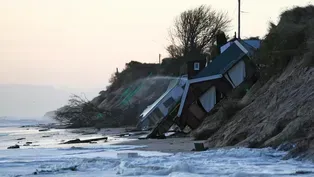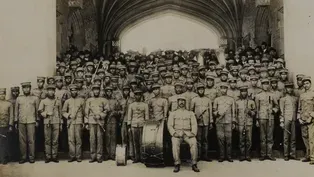
Turbulence on Singapore Airlines flight kills passenger
Clip: 5/21/2024 | 5m 26sVideo has Closed Captions
Severe turbulence on Singapore Airlines flight kills passenger, injures dozens more
One person is dead and roughly 70 others are injured after a Singapore Airlines flight headed from London to Singapore hit severe turbulence. The flight descended 6,000 feet in three minutes over the Indian Ocean, forcing the plane to make an emergency landing in Bangkok. Aviation correspondent Miles O’Brien reports.
Problems with Closed Captions? Closed Captioning Feedback
Problems with Closed Captions? Closed Captioning Feedback
Major corporate funding for the PBS News Hour is provided by BDO, BNSF, Consumer Cellular, American Cruise Lines, and Raymond James. Funding for the PBS NewsHour Weekend is provided by...

Turbulence on Singapore Airlines flight kills passenger
Clip: 5/21/2024 | 5m 26sVideo has Closed Captions
One person is dead and roughly 70 others are injured after a Singapore Airlines flight headed from London to Singapore hit severe turbulence. The flight descended 6,000 feet in three minutes over the Indian Ocean, forcing the plane to make an emergency landing in Bangkok. Aviation correspondent Miles O’Brien reports.
Problems with Closed Captions? Closed Captioning Feedback
How to Watch PBS News Hour
PBS News Hour is available to stream on pbs.org and the free PBS App, available on iPhone, Apple TV, Android TV, Android smartphones, Amazon Fire TV, Amazon Fire Tablet, Roku, Samsung Smart TV, and Vizio.
Providing Support for PBS.org
Learn Moreabout PBS online sponsorshipGEOFF BENNETT: One person is dead and roughly 70 others injured after a Singapore Airlines flight headed from London to Singapore hit severe turbulence yesterday.
The Boeing flight with 211 passengers and 18 crew on board descended 6,000 feet in the span of three minutes over the Indian Ocean, forcing the plane to make an emergency landing in Bangkok, where rescue crews were on the tarmac ready to assist the injured.
In a statement today, Singapore Airlines offered condolences for the deceased and said -- quote - - "We deeply apologize for the traumatic experience that our passengers and crew members suffered on this flight."
Our aviation correspondent, Miles O'Brien, joins us now.
So, Miles, pilots and air traffic control can often detect and avoid turbulence.
What seems to have happened here?
MILES O'BRIEN: Well, in some cases, they can, Geoff, exactly.
If you see some storm systems ahead, towering cumulus clouds, which generate thunderstorms and perhaps worse, prudent pilots and air traffic control will change the course of the aircraft to thread their way around it.
It's still unsettled air, however.
And so there can be a lot of turbulence in a region, particularly if you're trying to thread your way through those big buildups.
But there is another category of turbulence which could be at play here, called clear air turbulence, which really does come quite literally out of the blue.
And this can occur when you have rivers of air.
The jet stream is kind of like a river of air, except that it's wind at sometimes hundreds of miles an hour.
Oftentimes, when the atmosphere is unsettled, as it is more frequently in the world of climate change, you can get sudden changes in the direction of those rivers of air.
And that's what we call wind shear.
That changes the lift on the wing dramatically and quickly.
And that's why you get that sudden upset.
So - - and that is an almost impossible thing to detect.
There's no sensor on the aircraft or ability for weather forecasters or, for that matter, air traffic control to see that.
GEOFF BENNETT: Well, it would appear then that the fasten seat belt sign is more important than many travelers would realize.
MILES O'BRIEN: Indeed.
You know, it's funny.
We -- I think we take for granted, Geoff, that we're in a metal tube that is pressurized five or six miles above the surface of the Earth traveling within 10 percent of the speed of sound.
We're not in our living rooms.
And when you're watching that movie on the airplane, it is prudent, to say the least, to stay buckled because these things can and do happen.
And people should respect what they're doing, or at least for a moment, consider the fact that there is a certain amount of risk when you're doing this.
GEOFF BENNETT: Yes, indeed.
So, Miles, what actually causes severe turbulence?
You mentioned climate change.
Has climate change made it worse?
MILES O'BRIEN: Well, climate change, because of the way the temperatures are changing on our planet in different ways and at different paces, depending on altitude and latitude, is upsetting these streams of air, these jet streams, in a way that is creating more wind shear events.
Researchers at the University of Reading took a look at transatlantic flights and found a 55 percent uptick over the last 10 years in severe turbulence events.
That's a significant increase.
And so that's something that needs to be looked at.
Perhaps there is a technological way to identify these changes, these wind shears at altitude.
But, right now, we don't have a way of doing that.
GEOFF BENNETT: So, Miles, how should the airlines change their approaches to severe turbulence?
MILES O'BRIEN: Well, like so many things with the airlines, Geoff, I think we can agree they could be better at communicating to their passengers and making them understand what's going on.
It's important for the pilots, when they turn on that seat belt sign, to communicate why they did it and explain that we have reports of severe turbulence ahead.
So-called pilot reports are what pilots mostly use to identify rough patches.
That's fine if you're following another aircraft.
If you're the first aircraft in, that can be something that's completely unanticipated.
But let people know the seriousness of it and perhaps mandate that those belts be buckled when they are in their seats.
I mean, obviously, on a 12-hour flight, you have to get up and take care of whatever Mother Nature offers up.
But when you're seated, at least, those seat belts should be belted.
And the airlines, I think, need to reinforce that.
The other thing they can do, which I think I have seen the airlines doing more and more, I think you have seen it as well as you travel, is encourage their cabin crew to sit down more when they're headed for a rough patch.
Eighty percent of the injuries in these cases, not surprisingly, are among the flight attendants, because they are up and about with those huge heavy drink carts.
And getting them to sit down more often when there is that risk, I think, is a good idea.
Passengers need to understand this, though, because they get cranky because they're not getting their meal or their drink.
But they are there, after all, to keep us safe, not serve us meals.
GEOFF BENNETT: That is our aviation correspondent, Miles O'Brien.
Miles, thanks, as always.
MILES O'BRIEN: You're welcome, Geoff.
Bill Maher on book reflecting on his comedy and commentary
Video has Closed Captions
Bill Maher on his new book reflecting on decades of comedy and commentary (8m 58s)
'Climate refugees' sue Britain for failing to protect homes
Video has Closed Captions
'Climate refugees' sue British government for failing to protect homes from climate change (7m 53s)
Exhibit explores humans put on display at 1904 World’s Fair
Video has Closed Captions
Exhibit explores experiences of humans put on display at 1904 World’s Fair in St. Louis (4m 55s)
Giuliani, Trump allies arraigned in Ariz. electors scheme
Video has Closed Captions
Giuliani, Trump allies arraigned in Arizona fake electors scheme (4m 31s)
How Trump's alleged hush money payments led to his charges
Video has Closed Captions
How Trump's alleged hush money payments led to his charges in New York (7m 58s)
Taiwan's new president urges China to end threats
Video has Closed Captions
Taiwan's president urges China to end threats as Beijing says independence is 'dead end' (5m 37s)
Providing Support for PBS.org
Learn Moreabout PBS online sponsorshipSupport for PBS provided by:
Major corporate funding for the PBS News Hour is provided by BDO, BNSF, Consumer Cellular, American Cruise Lines, and Raymond James. Funding for the PBS NewsHour Weekend is provided by...

















